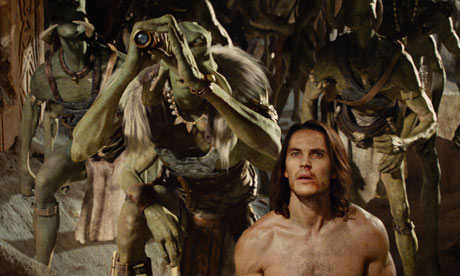Disney's latest effort, 'John Carter' looks set to be one of the biggest box office flops ever, losing in the region of $200m. Who'd have thought that a plot about an American Civil War veteran, transported to Mars to fight in another (presumably more Martian) war, wouldn't hang together as a film? Unbelievable.
Once the film was complete, Disney must have realised that they'd got a problem. Rough cuts of films are tested to see if audiences like them and so that they can be tweaked to get a better final product. If feedback from that early research looked anything like the Rotten Tomatoes reviews of the film, then Disney will have known pretty early on that they had a failure on their hands.
Take this contribution, from the Guardian's Peter Bradshaw.
Like Private Garlick in Good Morning Vietnam, "I have no idea what that means, Sir, but it sounds pretty negative to me."
Depending on which source you believe, Disney has spent somewhere between $50m and $100m marketing John Carter, almost certainly based on - at best - lukewarm pre-test results.
This never, ever, works. It's a golden rule of marketing that you cannot persuade a lot of people to buy a bad product by spending more on advertising. The first person who falls for it will tell all his mates that you lied and you've just wasted $100m.
In the end, this is a sign of whether a company really believes in research and is willing to follow through on the consequences of what they know. Any company that throws this amount of marketing money at a bad product, at its core, doesn't want to believe the research that it commissions. Disney hasn't just wasted $100m on marketing, it's wasted a smaller amount finding out ahead of release whether anybody likes their films too.
Once the film was complete, Disney must have realised that they'd got a problem. Rough cuts of films are tested to see if audiences like them and so that they can be tweaked to get a better final product. If feedback from that early research looked anything like the Rotten Tomatoes reviews of the film, then Disney will have known pretty early on that they had a failure on their hands.
Take this contribution, from the Guardian's Peter Bradshaw.
"I felt as if someone had dragged me into the kitchen of my local Greggs, and was baking my head into the centre of a colossal cube of white bread. "
Depending on which source you believe, Disney has spent somewhere between $50m and $100m marketing John Carter, almost certainly based on - at best - lukewarm pre-test results.
This never, ever, works. It's a golden rule of marketing that you cannot persuade a lot of people to buy a bad product by spending more on advertising. The first person who falls for it will tell all his mates that you lied and you've just wasted $100m.
In the end, this is a sign of whether a company really believes in research and is willing to follow through on the consequences of what they know. Any company that throws this amount of marketing money at a bad product, at its core, doesn't want to believe the research that it commissions. Disney hasn't just wasted $100m on marketing, it's wasted a smaller amount finding out ahead of release whether anybody likes their films too.




